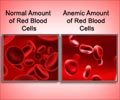A nutritional supplement known as Sprinkles, which can be added to children's food, reduces anemia by more than half, according to a recent study published in the Journal of Nutrition.
The study was led by Purnima Menon, Cornell Ph.D. '02, a research associate in the Division of Nutritional Sciences at Cornell. It is the first to show, using a rigorous study design, that Sprinkles can reduce the incidence of anemia among poor children enrolled in an ongoing fortified food aid program implemented under challenging, real-life conditions in developing countries.The research, conducted by Cornell's Division of Nutritional Sciences with the International Food Policy Research Institute (IFPRI), offers promising insights on how to reduce iron and other micronutrient deficiencies among poor people in developing countries. These deficiencies are a devastating problem worldwide, causing poor health, premature death and impaired development, says Menon. Children age 6 to 24 months are most vulnerable to suffering from iron-deficiency anemia.
"When combined with other food aid initiatives, the potential impact [of Sprinkles] is huge," said Marie Ruel, Cornell Ph.D. '90, director of IFPRI's Food Consumption and Nutrition Division and a co-author of the study.
The findings are based on a study in rural Haiti, where at least two out of every three children under age 3 are anemic. Children in the study were enrolled in a food aid program that included cereals fortified with iron and other micronutrients. After Sprinkles, a dry powder containing iron and other vitamins and minerals, were added to their food for two months, anemia rates among the children were reduced from 54 percent to 24 percent, and further reduced to 14 percent seven months later. However, anemia rates remained unchanged for those children in the study who did not receive Sprinkles.
The study also found that fortified food aid alone is insufficient to prevent anemia in infants and young children, even if mothers are advised to complement the donated commodities with locally available, iron-rich foods. This could be due to the fact that foods such as meat are too expensive for families to buy on a daily basis and that donated foods are often shared among all family members rather than consumed only by the child.
According to the study, it is highly feasible to integrate Sprinkles distribution and education into existing food aid programs. Mothers participating in the study indicated that they would be willing to buy Sprinkles if sold in local markets because they believe it will benefit their children and prefer it to other nutrition interventions. World Vision-Haiti currently assists mothers with purchasing Sprinkles from Population Services International, a social marketing firm, which markets them in Haiti under the name "Babyfer."
Advertisement
While the study took place in Haiti, its implications are global, she said. Sprinkles have been tried in other developing countries, such as Bangladesh, Ghana and Indonesia, and were found to be a very effective way to reduce micronutrient deficiencies.
Advertisement
SRM/C











